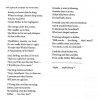4: Poem, Itsik Manger's “The Queen Comes to the King” from “Songs of the Megillah,” 1936.
Itsik Manger (1901-1969) was a Yiddish poet and essayist who was known as a sort of witty "folk bard" of his people. Born in the multiethnic city of Czernowitz, he was an avid reader of world literature and especially of the German Romantics. His most productive period as a writer was from 1928 to 1938, when he lived in Warsaw and produced volumes of poetry, edited a literary journal, and invented a new genre, which he called Khumesh-lider (Bible poems), in which he rewrote Biblical stories as modern ballads with characters living in contemporary Eastern Europe. His Megile-lider, from which the excerpt below was taken, was a continuation of this project. In Manger’s adaptation of the Megillah, Esther had been planning, prior to her marriage to Ahasuerus, to elope with a journeyman tailor named Fastrigosso. But upon being instructed by Mordecai to enter the beauty contest of King Ahasuerus, and then becoming his queen, she is forced to use her body and romantic charms in service of her people. In the passage below, Esther offers her plea to save her people from destruction in the form of pillow talk, making explicit the extent to which Esther must employ her sexuality as a tool for her people’s salvation, at great personal cost.
The original Yiddish version of the poem ("Di malke kumt tsum meylekh") may be found on pages 35-36 of Manger's book, digitized by the Yiddish Book Center and freely downloadable as a PDF. Do consider printing out the poem in Yiddish should students have some ability to access it in the original, even if they are only able to sound out some of the words.
The last words of the poem are the first words of the Book of Esther. With the first word repeated, as Manger has it, it would mean, "And it came to pass... and it came to pass... in the days of:".
Suggested Activity: Have your students read the passage and answer the following questions: in what way does this reading change your understanding of Esther, if at all? What adjectives would you use to describe Esther in this passage? Do you think Manger sees her as heroic? Do you think he judges her harshly? Is there anything about Esther in this passage that makes her a strong role model? What other texts in this kit do you feel most closely share Manger’s assessment of Esther?
Invite your students to write their own poetic adaptations of the scene wherein Esther pleads on behalf of her people (Esther 7). How do they imagine it, and the character of Esther, similarly or differently to Manger?
Source: Itsik Manger, “The Queen Comes to the King” from “Songs of the Megillah,” in The World According to Itzik: Selected Poetry and Prose, trans. Leonard Wolf (New Haven: Yale University Press, 2002), 48-49.

